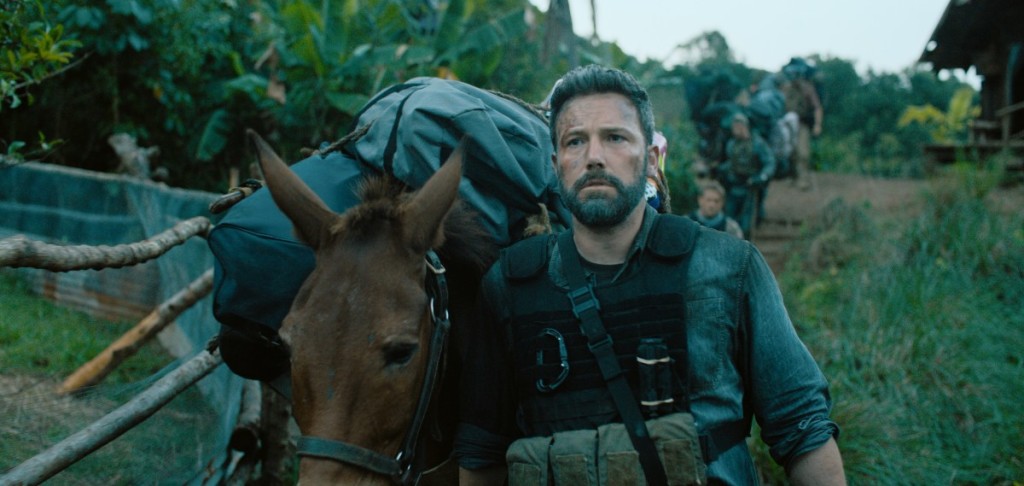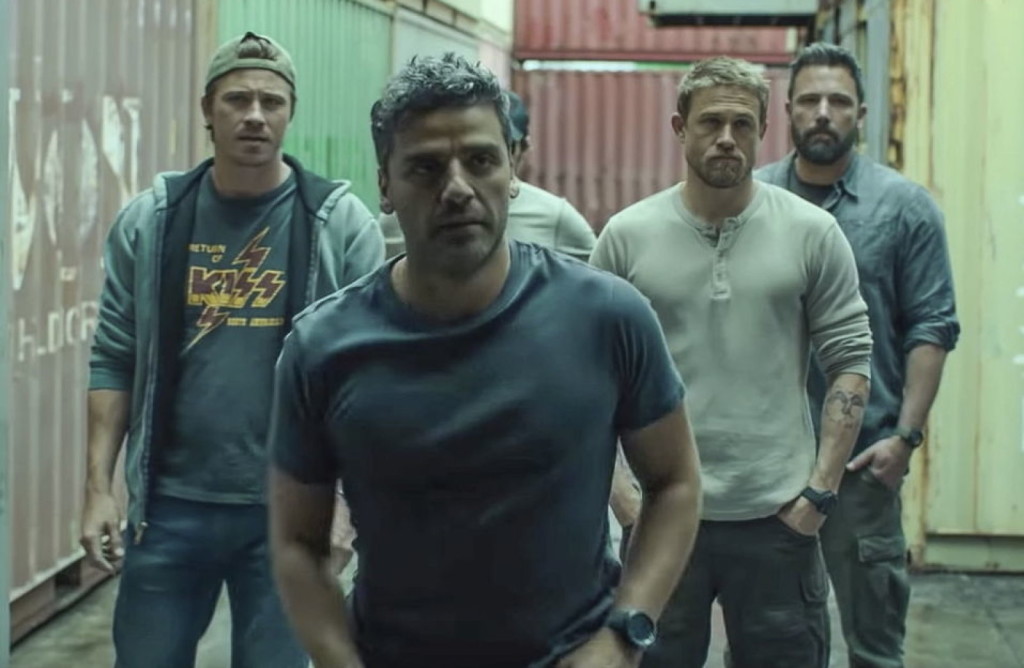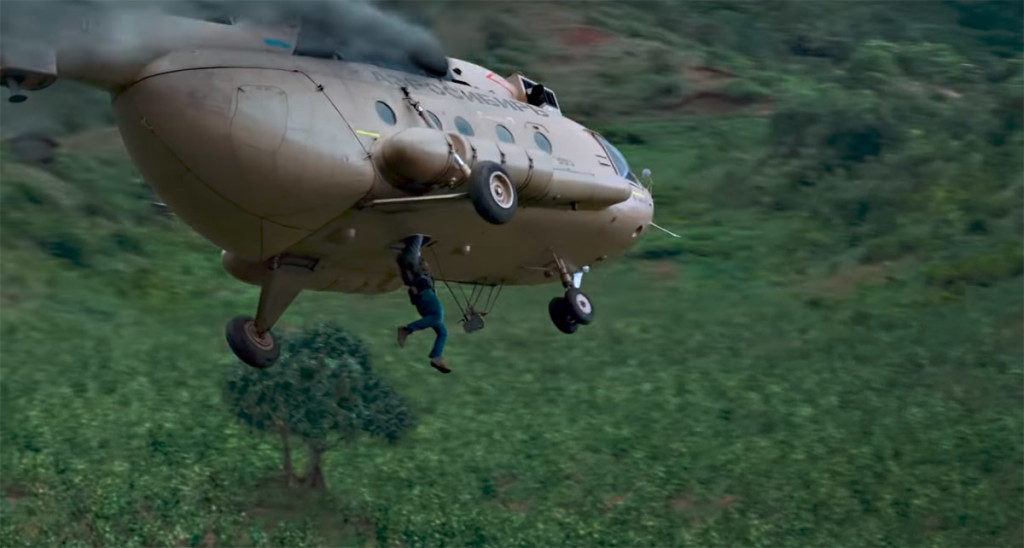Genre: Thriller/Drama
Premise: (from IMDB) Five former Special Forces operatives reunite to plan a heist in a sparsely populated multi-border zone of South America.
About: Frequent collaborators Mark Boal and Katheryn Bigelow were set to make this film back in 2010 with Tom Hanks and Johnny Depp. As happens all the time in Hollywood, development lagged long enough to see both Hanks and Depp leave, and soon even Bigelow dropped out so she could make Detroit (bet she stands behind that decision). The movie rose from the ashes when JC Chandor (Margin Call, A Most Violent Year) came on. He was joined by Depp again, Will Smith, Tom Hardy, and Channing Tatum. But the film wasn’t out of the clear yet. With just weeks before shooting, everything fell apart and the producers had to start all over again. That led us to the current cast, which includes basically plays himself Ben Affleck, constantly slips into a British accent Charlie Hunnam, and Chandor’s Violent Year star, Oscar Isaac.
Writer: J.C. Chandor & Mark Boal
Details: 125 minutes
Correct me if I’m wrong but I think this is the first time in history that the major movie release of the weekend came out on Netflix. What does that mean? I don’t know. I know Steven Spielberg has an opinion or two about it. But what’s unique about Triple Frontier is that it’s clearly an experience that works better on the big screen. This isn’t some goofball comedy. The helicopter sequence through the South American jungle alone is stunning enough that it would’ve shined at the Arclight. And yeah, I know, they put it out in theaters for a week. But it wasn’t a real release. It was in case the movie was nomination worthy.
As a lot of you know, I loved the Triple Frontier script. But I’ve been tepid about how it would translate, specifically because of Mark Boal. Boal gives you a specific kind of movie and doesn’t seem to know how to work outside of that. I remember watching Boal’s Zero Dark 30, being underwhelmed, and wondering why. On the surface, it should’ve worked. We’ve got a real life story about the hunt for the most notorious terrorist in American history. And yet it was boring. Why?
Then it hit me. The script only hit one beat: Serious. Every scene was about the serious nature of what they were doing and the serious problems they ran into and the serious characters who had serious opinions and serious discussions about those serious opinions. A movie should be a roller coaster. It should not be a train ride. We have to go up and down, sometimes even in a loop, to keep the story interesting. Boal doesn’t know how to do that and his screenplays suffer as a result. They’re never bad. But it’s impossible not to become a numb viewer when every scene is the same.
JC Chandor is a better screenwriter than Boal. But he operates in the same world. His stories tend to take themselves seriously. So I wondered if a collaboration between the two would do what you want collaborations to do – elevate the material. You want your co-writer to be strong where you’re weak, and vice versa. Not sure that was the case here. And yet the old draft I read was strong. Let’s see how the movie turned out.
Pope (Oscar Isaac) is an ex special forces soldier who’s doing bad guy clean-up work in South America. When Pope learns that one of the biggest drug dealers in the world has tens of millions of dollars stashed at his home in the jungle, he recruits his old special forces buddies, Redfly (Affleck), Ironhead (Charlie Hunnam), Ben (Garrett Hedlund) and Catfish (Pedro Pascal), to steal it. The “hook” here is that these guys have always abided by the law. This is the first time they’re going to break it.
The group flies to the Triple Frontier, the tri-border area along Paraguay, Argentina and Brazil, and start prepping for the heist. Redfly is the taskmaster. He makes it clear they’ve got a small window to get this done and if any red flags pop up, they bail. The group is shocked when they finally execute the heist and there’s 10 times as much money as they planned for. Now they have a new challenge – get all this money back to the US somehow. They’ve got a helicopter but it wasn’t ready for this kind of load. They’ll have to get creative and take some chances if they’re going to succeed. Of course, in the end, greed gets the best of them.
I liked Triple Frontier.
But it’s a frustrating movie in a lot of ways.
Somewhere along the 10 years of development, Boal and Chandor forgot to hit the beats that really matter, starting with the title itself.
In the script, it’s made clear why the Triple Frontier is such a badass place. They explain it’s the earth’s equivalent of Mos Eisley, one of the most crime-ridden dangerous places in the world. However, in the movie, you don’t even know what Triple Frontier is. You just know it’s the title. The reason this is frustrating is because the history behind the triple frontier sets up why this one guy has so much money stashed at his house. He’s the top dog in one of the most lawless places on earth.
This problem of forgetting to highlight the big moments when they happen continues throughout the screenplay. When the team gets to South America, we spend 25 minutes preparing for the heist. Then, out of nowhere, we’re in the house executing the heist. The moment came so stealthily, I assumed they were doing a test run. About midway through I realized this was the real thing. The heist is the most important moment in the movie! Why wouldn’t you make it clear it’s happening!
One of my favorite moments from the script was when they learn they’re not stealing 25 million dollars. They’re stealing 250 million dollars. Everyone’s excited but they also realize this changes everything. They weren’t prepared for this kind of load so now they have to rethink the plan. But in the movie, this moment occurs passively. They’re at the helicopter and Catfish and Pope have this conversation that amounts to, “Oh, by the way, we have 250 million dollars now so it’s going to be a little trickier.”
This was the irony that made the script so cool! In every one of these movies, the thing that goes wrong is that they end up with LESS money than they hoped. Triple Frontier flipped that and said, ‘No, we’re going to give you more. Lots more!’ But what seems like a good thing is actually what does them in, cause they didn’t plan to handle this much money but their greed tries to make it work anyway.
As for the changes in the script, I noticed a couple of things. The first is how the money is found. In the script, they go to the room where the money is supposed to be but it’s not there and they freak out. Then someone notices that the ceiling is leaking cause it’s raining outside. Which means they probably moved the money. The group keeps on looking and, indeed, it’s in another room. I liked the scene because you always want to throw curveballs at your heroes. It can never be easy for them. They show up, they think the money’s gone, but then they realize it’s somewhere else.
Boal and Chandor improve on this, however. Instead, the group shows up, the money isn’t there, they’re momentarily defeated, then someone realizes it’s in the walls. So they start breaking through the walls and ripping the money out. This achieves two things. First, it’s way more cinematic. The previous scene had them taking money off a pile of money. This version has them breaking walls to get the money. It just looks better. It also adds a component of urgency – do they have enough time to break down all the walls and get all the money? It turns out they don’t, which throws the operation off.
The other change they made is jumping into the heist sooner. In the script, the prep section was the longest section of the script. And, to be honest, not a lot was happening there. Prepping is tough in screenwriting because there’s something inherently repetitive about it. And I think Chandor realized that at some point and sped it up. I would even venture to guess that they shot the extra prepping and only realized in editing that they didn’t need it. Which probably has something to do with the neutered announcement of the heist itself.
I loved the helicopter stuff in the script and I love it here in the movie. The best you can ask for in screenwriting is a story that shines by showing and not telling. So if you’re writing a movie about greed, having a bunch of characters talking to each other about how much they love money and how they play the stock market and what car they just bought – that’s the worst possible exploration of greed. The best is in this movie. A helicopter is carrying a bunch of money through mountains that it’s not light enough to get through. So the characters literally have to decide how much money is worth their safety. We see their greed in that they can only push out so much money, even if it means risking their lives.
Another great example of this is Redfly (Ben Affleck). He’s the most practical of the group. He’s the one saying, “We’ve got this many minutes, we’ve got to hit this checkpoint by this time, that checkpoint by that time, if there’s any fluctuation, we ditch.” And then, when they find the money in the walls and they’re desperately trying to bash out as much as possible, it’s Redfly who’s the first one yelling out, “Don’t worry! I gave us a buffer!”
I can’t get past how much I love this idea. You’ve stolen all this money but to get from Point A to Point Z, you have to keep making decisions about how much you can leave behind. It’s the ultimate exploration of greed. And while I would’ve liked for Chandor to treat this more like a Hollywood movie with big beats as opposed to a “true story” like Zero Dark 30, I was still entertained the whole way through.
[ ] What the hell did I just watch?
[ ] wasn’t for me
[xx] worth the stream
[ ] impressive
[ ] genius
What I learned: HIT. YOUR. MAJOR. BEATS. HARD. Hitting your beats means when a major moment comes up in your story, you give it its proper due. For example, if a character has a baby, there’s an excitement that should permeate everyone associated with that character. The new mother doesn’t text her mom, “Had the kid. Still on for dinner, Sunday?” You must be true to the level of intensity that moment would provide. Triple Frontier doesn’t hit its big beats hard enough, from the triple frontier to the heist to the amount of extra money they stole. Those moments needed extra attention.




